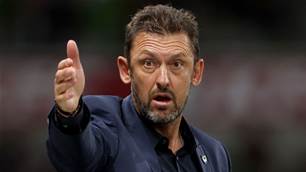It’s a good thing that John Aloisi is about as humble a bloke as you’d ever meet. If he wasn’t, he could easily be the biggest braggart in Australian sport.
It’s a good thing that John Aloisi is about as humble a bloke as you’d ever meet. If he wasn’t, he could easily be the biggest braggart in Australian sport.
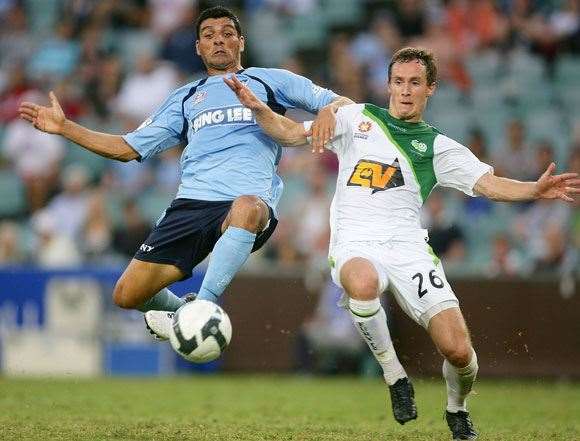 Aloisi still felt like a champ despite missing Sydney FC’s winning grand final through injury. Images: Getty Images
Aloisi still felt like a champ despite missing Sydney FC’s winning grand final through injury. Images: Getty ImagesForever immortalised for that penalty against Uruguay which sent Australia to its first World Cup in 32 years, there’s plenty of other achievements the new Melbourne Heart striker can bang on about. There’s his glittering 19-year playing career that’s seen him become the only Aussie footballer to grace the three biggest leagues in Europe – the English Premier League, Italian Serie A and Spain’s La Liga. There’s the World Cup appearance in 2006, his solo goal against Japan, and a haul of 27 goals from 55 internationals for the Socceroos – among them the four he scored at the 2005 FIFA Confederations Cup in Germany to win the Bronze Shoe. Who better to review Australia’s World Cup campaign than the man who got us there in ’06? Inside Sport also had a “heart-to-heart” with Aloisi about the new A-League season.
How did you cope watching the World Cup from this side of the fence?
It’s always different watching a game you’d love to be playing in, but I realised a few years ago that I wouldn’t be going
to this World Cup, so I just wanted to enjoy it as a supporter. It was the first time I’d got to watch Australia at a World Cup because, of course, last time I was there, and in 1974 I hadn’t been born. I really enjoyed it and thought the boys
did really well.
Opinion’s been divided on the overall spectacle of the tournament. What was your assessment of South Africa 2010?
It was a good tournament. There were quite a few upsets. To see Germany play the way they did – that was exciting football. Five years ago they were a pretty boring team to watch, but now they’re very exciting, fast and skilful. I was also excited to see Spain win. I played there for six years, so I love Spanish football and the people.
You would’ve been happy not to contend with the Jabulani?
Yeah (laughs). There were complaints last time (in 2006) about the ball and it did take a while to get used to it. You
could tell this time that there were players who were over-hitting their passes and it’s a pity FIFA ended up bringing out a new ball for a World Cup. They should just stick to the normal balls they play with all the time. People don’t realise it makes a big difference when the ball is different. I don’t know why FIFA changes these things. They should concentrate on helping the referees out. A lot of the talking points were about bad refereeing decisions. I’m not saying it was the referees’ fault, but most of the games were decided on bad decisions.
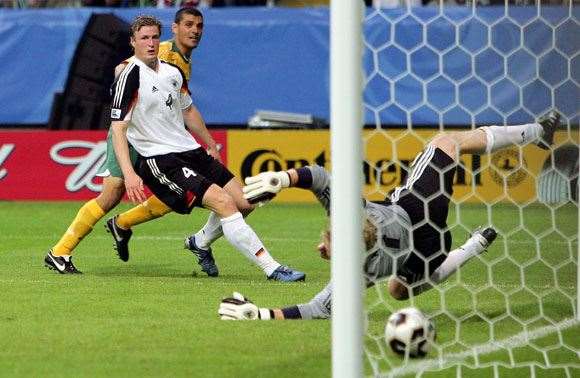 Aloisi put four past Germany in the Confed Cup in ‘05.
Aloisi put four past Germany in the Confed Cup in ‘05.Images: Getty Images
Surely the debate is now over with regards to video technology or the introduction of goal-line officials …
Something needs to be done – whether it’s video technology or having assistant referees behind the goals, like they
had in the Europa League. It’ll help the game come along so much because it still feels like we’re back in the ‘60s, when England scored that goal against West Germany that didn’t go over the line. I wouldn’t like to see video technology
on every decision, but I’d like to see the fourth official play more of a part. He’s sitting next to a monitor, so if he sees something very clear in such an important decision like a ball crossing the line or a penalty that’s given or not given,
he should be authorised to intervene. I don’t think you need to go upstairs, I just think the fourth official can do a bit more. What else is he doing there? Just telling the coaches to sit down when they’re standing up?
The vuvuzela: good or bad?
Good for South Africa, but let’s leave it there. I don’t want to hear it here in Australia! Every country has a different atmosphere at games. The European crowds are different, the South American crowds are different and Australian crowds are different, so let’s just leave the vuvuzelas over there.
What’s been the most annoying sound you’ve heard in the terraces?
I remember playing in Belgium, they used to have marching bands playing in the stands and that used to get pretty annoying, because they used to play old folk songs. It didn’t go well.
So the right team won the World Cup?
I think so. They didn’t always play unbelievably, but they tried to play good football all of the time. They knew how to win games, even when things weren’t going right for them. To lose their first match against Switzerland and not change anything shows they have faith in what they’re doing at the moment. I think winning Euro 2008 helped them believe they could win the World Cup.
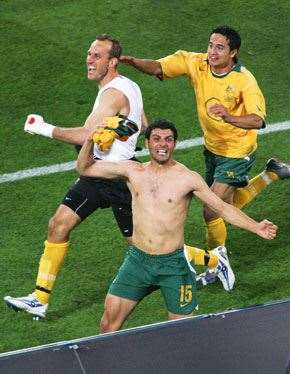 Uruguay probably remembers Aloisi’s finest moment for the Socceroos as
Uruguay probably remembers Aloisi’s finest moment for the Socceroos aswell as we do. Images: Getty Images
And the Socceroos’ performance?
The first game, as everyone knows, was a disaster in every aspect. It wasn’t the players’ fault; they didn’t believe in what they were doing and it showed when they were playing against the Germans. They looked a little bit lost and that wasn’t the Australian way. Usually we know what we have to do – go out and not win the game necessarily, but try and win the game, and they didn’t do that. In the next two matches they did. People can go on and talk about how good Germany were, which they were, but so were Ghana and Serbia – they’re both great sides. Serbia qualified very easily for this World Cup; they make it hard for any team and they beat Germany, so why didn’t we set up the same way against the Germans the way we did against Serbia and Ghana? We mightn’t have won, but we certainly wouldn’t
have lost 4-0.
Your prediction that the Socceroos would upset Germany came back to bite you on the arse ...
I played against Germany five years ago and I predicted that we’d score goals against them if we played the same way. We lost 4-3 then, but we had a go. And that was playing them in Germany. That’s why I thought we had a good chance. I still think if we did set up that way, the boys would’ve proved me right and caused an upset. But I did predict Timmy would score against Serbia and we’d win. So I got one out of two right!
How will Pim Verbeek be remembered?
The sad part about it is he’s going to be remembered for that German game. He did qualify Australia for the World Cup, which was great, but the Australian public won’t be so forgiving for that German game. You can win 20 games, but to lose one that’s so costly, that’s the way you’re going to be remembered. The same thing happened to Terry Venables. He went undefeated with the Socceroos for so many games, but he was remembered for not qualifying for the 1998 World Cup.For me, the belief wasn’t there from the boys – and that has to go down to the coach not believing in them.
There’s been a lot of talk about the need for the next coach to embrace the Aussie spirit. Fair call?
We need to embrace the Aussie spirit because that spirit is never going to die. We can change our style of football, but that spirit is always going to be the same. The Spanish have sort of adopted the way Holland played back in the 1970s, but they’ve done it with that Spanish flair. It’s the same with us. We need the belief that we can beat anyone. That’s what we were like before. We believed that we could beat Brazil at the last World Cup. We didn’t end up winning, but we weren’t disgraced either, and I thought we were unlucky not to get a result. It was the same against Italy. We believed we could beat the Italians and we probably should’ve beaten them. We believed we could beat Japan, even when 1-0 down with only seven minutes left. That spirit will never die and we have to keep playing that way, even if the style changes.
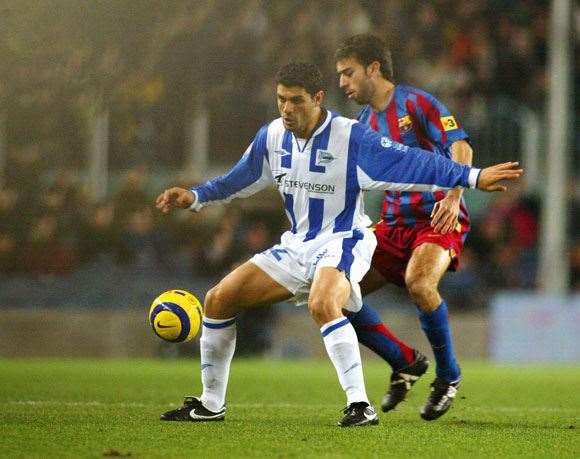 Aloisi in action.
Aloisi in action.Images: Getty Images
Everyone seems to have an opinion about the passport of the next coach. What’s your preference? Do we have a local coach good enough to develop the squad and qualify for 2014, or do we still need a foreigner at the helm?
We need a foreigner. We haven’t got a coach at the moment that’s good enough. We have good coaches coming through, but I don’t know when they’re going to be ready and we have to be realistic. There’s no Aussie coach good enough to not only lead Australia to the World Cup, but also do well while we’re there.
The 2011 Asian Cup is only a few months away. Is it a tournament we should set ourselves up to win, or use to develop our future crop?
If players aren’t going to be around for the next World Cup, they shouldn’t be going to the Asian Cup. I think they have
to look at not winning it so much – try to win it if you can – but mainly develop these young players to make sure they’re ready for the next World Cup. That’s more important. We need to blood some younger players.
Have you officially retired from international football?
I never officially retired from international football, but you sort of know when your time’s up and my time is up at the moment. I’ve only got this year left in me, so it would be silly of me to put my hand up.
Exciting times ahead for you and your new Melbourne Heart team-mates. What’s it like being on the ground floor of a new club?
Of course there are teething problems, but it’s very exciting because you can put things right. The club is working really hard to make sure they’ve built a good foundation for a club that will be successful for many years. We’re lucky to have a coach who’s been at one of the best clubs in Europe, so he can give advice and help people along. Hopefully we’ll be a club that will be successful for a long, long time.
With the team John van ‘t Schip has assembled, winning the championship appears a realistic goal – on paper anyway ...
We have to look first at gelling the side together. The majority of players have never played together and “JVS” wants
us to play differently to what most of us are used to. That’s what we have to look at first and look at getting a good start. We’re not going to come out and say we’re going to win it in our first year, but we can be very competitive. At the end of the season, if you’re in the finals, anyone can win it.
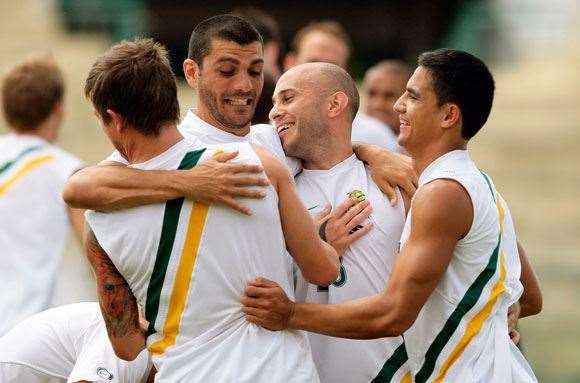 Aloisi – and everyone else – in Socceroos camp in ‘07.
Aloisi – and everyone else – in Socceroos camp in ‘07.Images: Getty Images
Which teams do you think stand in the Heart’s way?
Everyone is a major rival because the league is so equal. I don’t think there’s going to be any team who will run away with it. It’ll be the strongest A-League season ever because of the number of good foreign coaches who have come into the league, as well as the players.
Do you think the Melbourne derby can become an iconic fixture on the Australian sporting landscape?
No doubt about it. I think this fixture will be up there in Australia with the best derbies we used to have in the old NSL. Eventually it will be one of the biggest in the country.
You’ve won two Premier’s Plates and have a grand final winners medal, but you missed the last season’s grand final through injury. Does that serve as extra motivation this season?
Not really. I just want to do well because it’s my last season. I always want to win. It was disappointing that I couldn’t play in the grand final, but I felt part of that side because I played in most of the games leading up to it. It’s just one of those things that happens in football. That’s not going to motivate me more: I’ve always got that hunger for winning.
You’ll be coaching Melbourne Heart’s youth team full-time next season. Is the plan to eventually coach at a senior level?
Of course. This is a good starter for me and eventually I’d love to be able to coach at senior level. I couldn’t have learned from anyone better than John van ‘t Schip … Hopefully I’ll coach at a very high level.
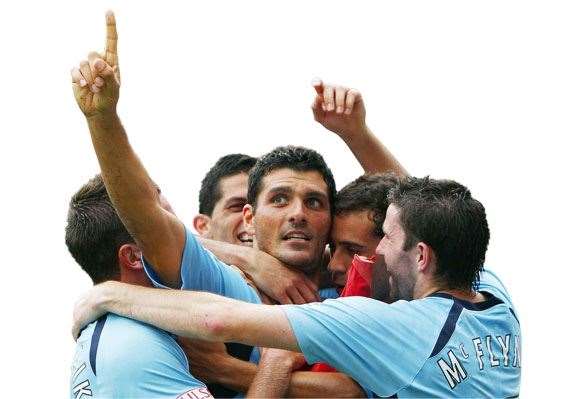 This year, Aloisi’s number-one goal is victory for the Melbourne Heart.
This year, Aloisi’s number-one goal is victory for the Melbourne Heart.Images: Getty Images
How do you see the future of the A-League?
In the long term we have to look at being the best league in Asia. At the moment, we’re not: it’s the Japanese first, then the Korean league, and there are also the Middle Eastern countries that attract a lot of players because of the money they’ve got. But if we can end up being the best league in Asia, then television money will come into play and we can attract even better players. That’s very possible. We have the advantage of being the only football code in Australia that can play through Asia, so there’s a lot of sponsorship and television money there to be made for clubs. It’s a slow process, but I think it’ll happen.
Is hosting the 2022 World Cup essential to the growth of the competition?
It would help for sure, but even if we don’t get it, I still think the competition will grow – probably not as quick, but it’ll still get there. You can’t just put all of your eggs in the one basket and hope that we’re going to get 2022 just to save the game here. We need to have back-up plans and make sure that the game grows no matter what.
What would hosting the 2022 World Cup do for the game here?
It’s unlimited. People who’ve been to a World Cup and have seen what it’s like first-hand know what the World Cup is all about, but the majority of Australians don’t know. When they see what it’s all about, they’ll realise that it’s the biggest event in the world. We’ll get more players, more kids and more people following the game because they’ll want to be part of the best game in the world. I’m not disrespecting any other sport or code, but we play a sport that’s the most-played one in the world, with the highest following and highest television audiences. It‘ll really help our game grow once people see how big it really is.
Maybe you’ll be coaching the Socceroos by then?
That would be a dream come true (laughs).
– John Iannantuono
Related Articles
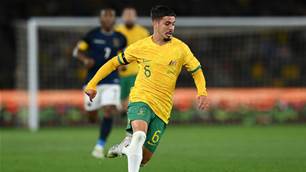
Tilio eyes A-League return in bid to escape Celtic rut
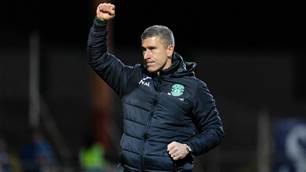
Champion A-League coach set to join Premier League giants
